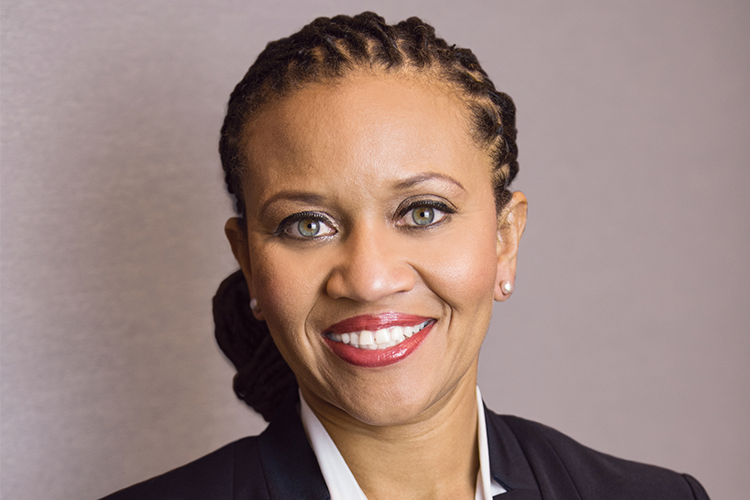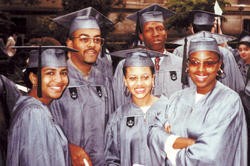First Deputy Mayor Sheena Wright: Catching Up with the South Bronx-Raised, Harlem-Made Double Columbia Alumna
Buoyed by the example set by her mother, First Deputy Mayor Sheena Wright encourages the women of New York to "listen to your inner voice."

Sheena Wright (CC'90, LAW'94) was named the First Deputy Mayor of New York City in December, a role known as being the Chief Operating Officer for the city.
"I've got to make a lot of decisions and drive execution of all of the things," Wright told Neighbors on a phone call this spring. "The mayor describes this using a football analogy: there’s the offensive coordinator and their job is to get the ball down the field, to make sure all the players are in the right place so that we can get all the touchdowns and win the game. That’s what the First Deputy Mayor does: they’re running the day-to-day. It is driving the execution."
Wright has lived in Harlem since she was 17 years old when her mother, prominent activist and public health leader Debra Fraser-Howze, moved to the neighborhood and Wright began her undergraduate career at Columbia University.
"I am a born-and-raised New Yorker and I really appreciate that privilege and distinction," Wright said. "I grew up in the South Bronx. My mom was 15 when she had my sister and 17 when she had me, very young. That kind of lived experience, the real struggle that she had to endure to propel herself and make sure that there was a real path of opportunity for her children, is part of what drives me and the work that I do today and that I've done over the course of my career."
From her days as a student at Columbia to her time as President and CEO of United Way of New York City (the first woman to lead that organization), Wright has held the lessons her mother taught her as young person close to her heart. She sat down with Columbia Neighbors to share how those early influences shaped her into the public servant she is today, what she remains hopeful about for the future, and the advice she'd give others looking to achieve their dreams.
Tell me a little bit about where you grew up, what your experience was like, and how that informed your career aspirations.
My mother was very tenacious: She went to a high school for pregnant girls, she went to college and she took us with her when she had to. She never stopped her own forward progress even though she faced a lot of obstacles.
She wanted to make sure that we also had opportunities and that was hard to find, quite frankly, in the South Bronx where the public education system was not good. We had a lot of really bad schools, so she lied to get us into a better school and we took a bus like an hour and a half to go there. I went to what felt like a quality school for the first time in sixth grade.
It's those experiences of struggle and challenge with access to opportunity, appreciating that some neighborhoods or communities have a real level of disinvestment, that then when I got to this middle school, I had a great educational experience, got a full scholarship to a boarding school [The George School], and got a scholarship to Columbia, and then you kind of see this whole other world of people that have access to opportunity. And so my trajectory has really been about: how do we bridge that gap and make sure that there is access to opportunity to neighborhoods and communities and people that have historically not had that?
Is there any phrase your mom would say to you when you were growing up that inspired you?
She was always very clear that there is absolutely nothing that you can't do. If you want to do it, you can do it no matter what anybody might suggest or say about who you are. You can do it.
My mom was always very clear that there is absolutely nothing that you can't do. If you want to do it, you can do it no matter what anybody might suggest or say about who you are. You can do it.
I think that that was really important when I went to boarding school and it was not a diverse community. It was a great experience, a wonderful opportunity, but people had preconceived notions about what I could or could not do because I'm Black, because I'm a woman, and because I'm from South Bronx.
I remember very specifically, a classmate at boarding school was like, “You're Black, you’re a woman, you're from South Bronx, isn't that like having three strikes?” I was like, “Absolutely not.” I think what I got from my mother was that those things make me strong, those are assets. Really appreciate that your capabilities are endless and it's really up to you in terms of what you want to do and accomplish and achieve.
How did the Upper Manhattan community shape you?
My mother moved to Harlem when I was 17 and I was a student at Columbia. She lived in a building where, in the mid-eighties, there were landlords just abandoning the buildings and not paying their taxes. There was the crack epidemic and a significant amount of blight that had taken over. Then the city became one of the biggest landlords, which is not how it should be. In my mother’s building, there were a lot of single moms and they kind of rallied together to push for improvements in the neighborhood. One of the things they did is that they bought their building from the city as part of a tenant interim lease program. They bought the building, got resources together to rehabilitate it, and became owners of the co-op. They also really activated neighborhood safety.
My mom worked at the New York Urban League, which was all about community improvement and well-being and revitalization. She was very focused on young people and young women in particular who had gotten pregnant, helping them kind of push through and redirect their lives. At the time, it was a dual crack and HIV epidemic and so many people were also dying in communities of color and they weren’t really getting as much focus and attention and resources.
All of this was swirling and happening while I was a student at Columbia and coming from the perspective of Columbia as being a part of greater Harlem, I was able to do work in terms of my extracurricular activities that were in support of Harlem. I was a member of a sorority and one of the things that we did is we volunteered at Harlem Hospital with babies needing physical contact for their kind of growth and developmental well-being. We were also fighting for economic opportunity, educational opportunity, and employment opportunities as part of the Black Student Organization. We really wanted Columbia to take more responsibility for being such a major stakeholder in the community.
When did you realize that Columbia was a place you wanted to go? You are actually a double alumna, of Columbia College and Columbia Law School.
I was at a boarding school in this community that had more cows and people. I’m a New Yorker, so I really wanted to be back in an urban setting for school. I wanted to come home. Columbia is academically rigorous and I did appreciate the concept of the Core, even if I did rail against it because it was not as diverse as it needed to be at the time. It has made a lot of progress since then.

It was phenomenal going to college in New York City. I got to experience New York in a different way as a young adult, as a Columbia student. Similarly, going to Columbia Law School. Great professors, great community, great student body. While I was in undergrad, there were law students that I saw and knew and got to understand what their experience was like. I knew it would be a supportive environment for me. When I went to law school, I actually had a one-year-old and I was looking for an institution where I could find my network of community to support my trajectory at that time.
You were a Trustee of the university before becoming First Deputy Mayor. What was it like to help shepherd such an institution?
It was phenomenal and I miss it. I got an opportunity to really see how things work. It is such a huge institution, right? I went to two of the schools, but I got to understand Columbia Medical School all the way to Columbia Business School. You begin to appreciate so deeply how big and diverse and complex and impactful an institution is. The trustees are an amazing group of people who are so dedicated not only to Columbia but to New York City and the broader community. It’s funny because my Columbia history spanned three presidents and they were all very different. Lee Bollinger is a phenomenal leader and I think really helped lead and drive Columbia to be its better self.
What advice do you have for people, women in particular, in Upper Manhattan, The Bronx, New York City, as they’re trying to carve a path for themselves?
Sometimes I think women, we’re so busy, we’re juggling a million different things including being underestimated because of our gender. I think for me, sometimes, the advice I need is to really pause and reflect. Listen to that inner voice, that thing that pulls you.
Sometimes, the advice I need is to really pause and reflect. Listen to that inner voice, that thing that pulls you ... If you really lean into that, it is like a propellant.
In my trajectory, it has been about what you feel called to do. If you really lean into that, it is like a propellant, right? It is fuel to help you keep pushing and going and doing. It’s like you’re feeding that appreciation and understanding of what you’re being called to do and that helps push you forward.
What are you most excited about in your work as First Deputy Mayor?
It has been such a humbling experience to be able to be in this seat, in this role, and to be of service. I’m very excited about driving change. Being a born-and-raised New Yorker, I love the city, but I do not think we’ve been our best selves. There isn’t equitable access to opportunity. Our educational institutions are not what they need and should be.
To be in a seat to be able to drive that, I think we’re going to transform the educational institutions of New York. We’re going to drive community well-being in communities that have been consistently neglected and everyone will benefit. It requires this constellation of effort, all the stakeholders: government, corporate sector, non-profit sector, and academic institutions.
What makes you hopeful for the future of New York City?
The people. COVID was so difficult, but there is so much hope, so much talent. I just think to be a New Yorker you gotta have an energy and an edge and I just feel like, I always feel like we have everything we need. Right? We've got a lot of brilliant people, we've got a lot of great energy. There are lots of resources in this city, and if we can really just focus and bear down on some really big collective goals to move the city forward, I don't think that there's anything we can't do.